[Dec 2007, Volume 4 Quarterly Issue] Pdf File size - The IIPM Think ...
[Dec 2007, Volume 4 Quarterly Issue] Pdf File size - The IIPM Think ...
[Dec 2007, Volume 4 Quarterly Issue] Pdf File size - The IIPM Think ...
Create successful ePaper yourself
Turn your PDF publications into a flip-book with our unique Google optimized e-Paper software.
REIMAGINING INDIA<br />
country grows it would be more important<br />
to build up institutions within India which<br />
are functional and proactive. <strong>The</strong> government<br />
has a very critical role to play in building<br />
up action oriented efficient institution<br />
structures and in implementing them. <strong>The</strong>se<br />
institutions have to facilitate the functioning<br />
of the market in an efficient way in certain<br />
segments of the economy to promote the<br />
growth of the Indian economy. This has to<br />
be facilitated by sound governance framework<br />
in Indian economy to address the developmental<br />
dimensions of India along its<br />
growth path. <strong>The</strong> next section briefly highlights<br />
the governance aspect.<br />
<strong>The</strong> Governance Aspect<br />
With regard to governance structure the<br />
important issue to ponder about is the role<br />
of the government market driven economy.<br />
In context of India, the role of government<br />
has to be efficient provisioning of public<br />
ment. This needs efficient functioning of<br />
the departments and the bodies associated<br />
with the basic infrastructure services. However<br />
the expenses for such provision of infrastructure<br />
and health care services should<br />
also be met through collection of taxes. <strong>The</strong><br />
tax collection policy has to be well targeted<br />
and progressive. This would mean that people<br />
with higher income would pay higher<br />
Market oriented growth is not a solution to the mitigation<br />
of this problem of conflicts. <strong>The</strong> role of a debating, progressive<br />
society holds the key towards this conflict resolution<br />
and for which government has to take a proactive role<br />
goods, services like safe, wider road networks,<br />
hospital services, water and sanitation<br />
services. In certain cases of such provisioning<br />
public private partnerships could be<br />
tried out in the form of concession, management<br />
contracts. <strong>The</strong> efficient functioning of<br />
these partnerships would again depend to a<br />
large extent on the nature and extent of implementation<br />
of such contracts, reduction of<br />
corruption in the process of awarding contracts.<br />
Efficient delivery of basic infrastructure<br />
services like safer roads, water and<br />
quality health care could tackle many of the<br />
developmental dimensions of the economy,<br />
which is lying at a dismal state at the mo-<br />
taxes for the provisioning of the infrastructure<br />
services for development. <strong>The</strong> key towards<br />
the success of this is the implementation<br />
mechanism which has to be monitored<br />
and reviewed from time to time. An accountability<br />
framework has to be brought in<br />
the governance structure for trickling down<br />
of growth of Indian economy towards development.<br />
This trickling down in simpler<br />
terms would mean provision of basic services<br />
like road, health care, water, information<br />
network to the rural areas of India.<br />
Along with that this would also mean provision<br />
of finance to the rural people for generation<br />
of economic activities and income<br />
for them.<br />
<strong>The</strong> growth of self-help groups and microfinance<br />
with favorable interest rate structure<br />
along with a reduction of intermediaries<br />
and informal lending could be one possible<br />
step in this direction. Larger penetration of<br />
banks, ATMs by allowing large number of<br />
players in banking segment could also be<br />
another step in this direction. However, this<br />
would need the support system of a governance<br />
framework, which would facilitate the<br />
efficient players to operate in the system.<br />
Market led growth thereby doesn’t necessarily<br />
mean a lesser government intervention as<br />
market led growth could often create a larger<br />
need for regulating the costs of growth so<br />
that growth could percolate and transit towards<br />
development of the society. Thus the<br />
importance of the government increases in<br />
that case with a change in its governance<br />
framework and operational structure. If this<br />
doesn’t happen then it could be termed as a<br />
failure of the governance framework, which<br />
could create disparities in the society<br />
through larger conflicts across sections of<br />
the society. <strong>The</strong> type and extent of these<br />
conflicts would vary from place to place and<br />
from region to region. <strong>The</strong>se could range<br />
from conflicts having their origin in caste<br />
discrimination (like the ones prevalent in<br />
Bihar) to conflicts, hatred originating from<br />
one section of the society, which has been<br />
deprived of the fruits of growth and development<br />
(like the ones in the North-Western<br />
parts of Andhra Pradesh, North-Eastern<br />
states of India). <strong>The</strong>re could be many other<br />
forms, but the two has been cited to bring<br />
out the role of the failure of governance<br />
framework in the development of a country<br />
even with the presence of a market driven<br />
growth. <strong>The</strong> caste driven conflict (ones in<br />
Bihar) could be because of corruption and<br />
the political system as well as an ineffective<br />
education system. <strong>The</strong> resource scarcity and<br />
developmental needs driven conflict (ones<br />
in Andhra Pradesh, North-Eastern states of<br />
India) could be because of a lack of governance<br />
framework to enable efficient distribution<br />
of resources between regions across<br />
India. Conflict resolution is an integral part<br />
of development of a country. It arises because<br />
of domestic failures and exists because<br />
of ineffective implementation of stated policies,<br />
contracts. Market oriented growth is<br />
not a solution to the mitigation of this problem<br />
of conflicts. <strong>The</strong> role of a debating, pro-<br />
34 THE <strong>IIPM</strong> THINK TANK


![[Dec 2007, Volume 4 Quarterly Issue] Pdf File size - The IIPM Think ...](https://img.yumpu.com/29766298/33/500x640/dec-2007-volume-4-quarterly-issue-pdf-file-size-the-iipm-think-.jpg)

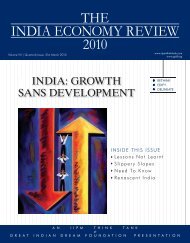
![[Feb 2008, Volume V Annual Issue] Pdf File size - The IIPM Think Tank](https://img.yumpu.com/43961117/1/190x245/feb-2008-volume-v-annual-issue-pdf-file-size-the-iipm-think-tank.jpg?quality=85)
![[June 2008, Volume V Quarterly Issue] Pdf File size - The IIPM Think ...](https://img.yumpu.com/41693247/1/190x245/june-2008-volume-v-quarterly-issue-pdf-file-size-the-iipm-think-.jpg?quality=85)


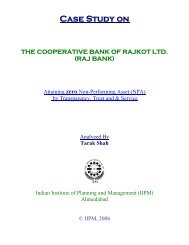


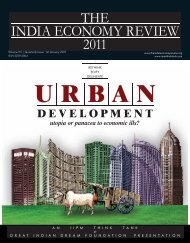

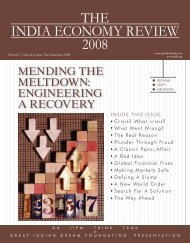
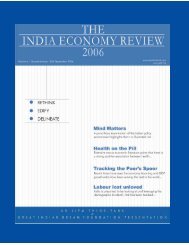
![[Volume VI | Quarterly Issue: 31st May 2009] Pdf File size](https://img.yumpu.com/27796051/1/190x245/volume-vi-quarterly-issue-31st-may-2009-pdf-file-size.jpg?quality=85)